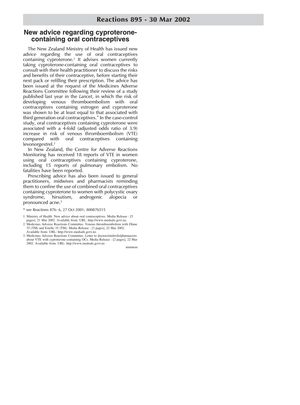TLDR Some birth control pills increase blood clot risk; use them for specific conditions only.
In 2002, the New Zealand Ministry of Health advised women using cyproterone-containing oral contraceptives to consult their health practitioners due to a study indicating an increased risk of venous thromboembolism (VTE). The study, published in the Lancet, found that these contraceptives were associated with a 4-fold increase in VTE risk compared to contraceptives containing levonorgestrel. Following 18 reports of VTE, including 15 cases of pulmonary embolism, associated with cyproterone-containing contraceptives, the Ministry issued prescribing advice to limit their use to conditions like polycystic ovary syndrome, hirsutism, androgenic alopecia, or severe acne. No fatalities were reported.
 63 citations
,
January 2012 in “The European Journal of Contraception & Reproductive Health Care”
63 citations
,
January 2012 in “The European Journal of Contraception & Reproductive Health Care” Some birth control pills have a higher risk of blood clots than others.
 76 citations
,
December 2009 in “Clinics in Dermatology”
76 citations
,
December 2009 in “Clinics in Dermatology” Hormonal treatments can help with acne but are not the first choice due to side effects and the need for careful patient selection.
 31 citations
,
June 2015 in “British Journal of Dermatology”
31 citations
,
June 2015 in “British Journal of Dermatology” Hormonal treatments are effective as a second-line option for moderate-to-severe acne in females, but should be used with caution due to health risks.
 1 citations
,
March 2013 in “The European Journal of Contraception & Reproductive Health Care”
1 citations
,
March 2013 in “The European Journal of Contraception & Reproductive Health Care” The paper suggests that France's suspension of Diane-35 was hasty and could cause treatment issues and unintended pregnancies, recommending a re-evaluation and better patient information.
 5 citations
,
May 2017 in “Current Opinion in Pediatrics”
5 citations
,
May 2017 in “Current Opinion in Pediatrics” Hormonal therapies are safe and effective for treating acne in female adolescents, with specific treatments for those with endocrine disorders.





